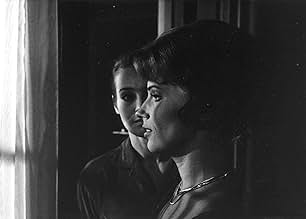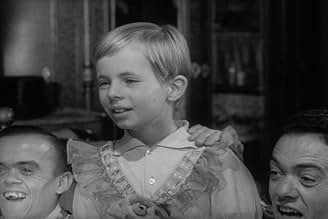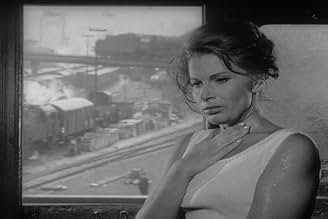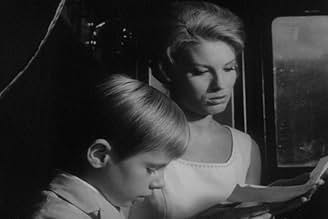Two estranged sisters, Ester and Anna, and Anna's 10-year-old son travel to the Central European country on the verge of war. Ester becomes seriously ill and the three of them move into a ho... Read allTwo estranged sisters, Ester and Anna, and Anna's 10-year-old son travel to the Central European country on the verge of war. Ester becomes seriously ill and the three of them move into a hotel in a small town called Timoka.Two estranged sisters, Ester and Anna, and Anna's 10-year-old son travel to the Central European country on the verge of war. Ester becomes seriously ill and the three of them move into a hotel in a small town called Timoka.
- Awards
- 3 wins & 2 nominations total
- Woman in Variety Hall
- (uncredited)
- The Paperboy
- (uncredited)
- Man in Variety Hall
- (uncredited)
- Impressario
- (uncredited)
- The Bar Owner
- (uncredited)
- The Doorkeeper
- (uncredited)
- Anna
- (uncredited)
- The Cashier
- (uncredited)
- The Old Man
- (uncredited)
- Director
- Writer
- All cast & crew
- Production, box office & more at IMDbPro
Featured reviews
It's a study in contrasts. It's about the strife sewn into the lining of family intimacy, contrasted with the perfection of strangers engaged in the base behaviors. Complexity vs. Simplicity. The common ground shared by youthful innocence and ignorance vs. the confusion imposed by years of living. Short people seeking acceptance vs. normal folk who are so completely unacceptable to each other. It's about a dying woman whose life's work is translating one language to another so others can understand it vs. two people who speak the same language who cannot understand each other (further) vs. two other people who speak different languages who have a better understanding than those sharing a common lexicon. And on and on.
Watching this film, it occurred to me how deeply Bergman's work influenced the likes of Kubrick and Hitchcock and Aldrich and Leigh so many more. 2001 Space Odyssey, Psycho, so many of the great films have seeds here. The screen was Bergman's canvas; the camera his brush. Neither the script nor the imagery alone created the work. His work has a soul from the combination of all of it.
Watch Bergman's life's work and save yourself a bundle on film school. You'll be in the master's care.
Ester, Anna and Johan are in a city whose language they don't understand and no one understands their language. Isolation, silence.
There's something surreal, almost buñuelesque, in "The Silence". Johan sees and feels many things, but he can't really understand them. The train is arriving in the city and Johan stares out of the train window - he sees many war tanks heading somewhere. He doesn't know what to do with himself... he wanders through the corridors of the hotel in which they are staying and he meets midgets from a wandering troupe. The relationship between the two sisters, Anna (his mother) and Ester (once so strong and now so very sick) is growing tenser. Johan tries to understand, walks along the hotel corridors, plays... he tries to lean on someone.
We see through the eyes of Johan (chaos and the search for love) and Anna (rebellion, desire, the search for something/someone) and Ester (fear and hope succeeding each other).
Ester, Anna and Johan - they are together but so very far apart. Johan, Anna's little son, is the only one that wants to establish a real connection, but when the film ends, he has already begun to suspect what life's about - the first steps to a rude awakening.
There are not many films like "The Silence". This film is really what could be called a masterpiece. It is very difficult for me to describe "The Silence" and the feelings/emotions it provoked in me. All I can say that it is a very rich film and each viewing will reveal new things and different angles to the viewer. "The Silence" is cinematic art in its purest form.
The film may be viewed on several levels -as the story of two sisters who apparently used to be close but are not able to communicate and understand one another anymore. Or it can be interpreted as a parable of Sensuality, Intellect, and Innocence, that cannot coexist in the world where God does not exist. As with every great and intelligent work of art, "The Silence" has so much to offer to its viewer, it's got so many questions to ask and it does not provide the easy answers.
Complex, suffocating, screaming through the silence, poignant, passionate, harrowing yet strangely hopeful and even funny sometimes - this is an unforgettable film, a masterpiece, a hidden treasure that has to be rediscovered and to receive as much praise and admiration as "Persona" and "Cries and Whispers" - for both of which "The Silence" was an inspiration. The acting by two Bergman's actresses is a miracle (as usual) as well as Sven Nykvist's camera work in creating the claustrophobic world where silence cries, whispers, and kills...
Often referred to as the third in a trilogy, it is more profoundly the third in a sequence of three world class pieces of cinema, as the emotions and frustrations of Ester (Ingrid Thulin) carry the viewer over a threshold of uncertainty, inconclusiveness, bewilderment and confusion - with Gunnel Lindblom as Anna playing her part to perfection too - but don't ask me why, because the gaps reach to the sky.
Did you know
- TriviaThe language in the movie is Gun Grut Bergman's creation. She was a translator and linguist in Slavic languages. The name of the city, which is indicated first in the train's speaker, and then by Anna, as Timoka, is a real word however. Bergman found it in a book in Estonian on the bookshelf of his wife Käbi Laretei. When he asked what it meant, she replied "belonging to the hangman".
- Quotes
Ester: I didn't want to accept my wretched role. But now it's too damn lonely. We try out attitudes and find them all worthless. The forces are all too strong. I mean the forces... the horrible forces. You need to watch your step among all the ghosts and memories.
Ester: All this talk... There's no need to discuss loneliness. It's a waste of time.
- Alternate versionsThe original UK cinema release featured the pre-edited US print which was then cut by a further 35 secs by the BBFC to shorten some shots of Ester stroking Anna's hair and to replace subtitled references to erections and semen. The 1999 Tartan video is the complete version.
- ConnectionsEdited into Journal d un père (2023)
- SoundtracksGoldberg Variations, BWV 988 - Variatio 25
Music by Johann Sebastian Bach
- How long is The Silence?Powered by Alexa
Details
Box office
- Gross worldwide
- $14,199
- Runtime1 hour 36 minutes
- Color
- Aspect ratio
- 1.37 : 1
Contribute to this page




























